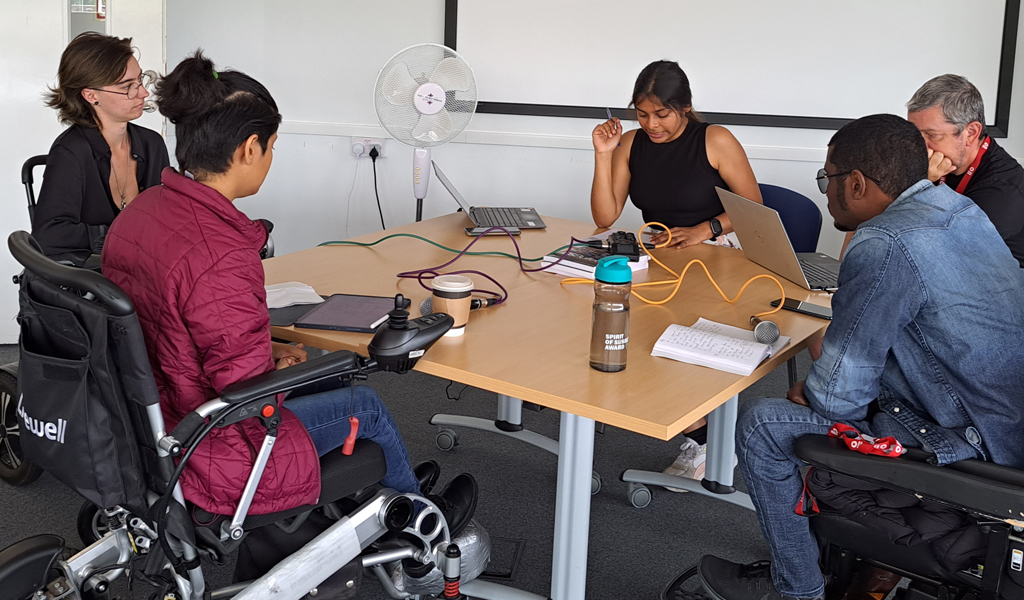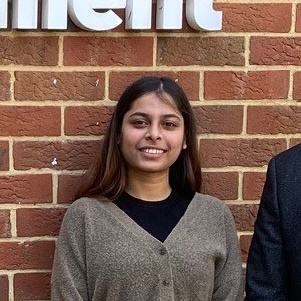Jigyasa Agarwal, class of 2023 (Master’s in Governance, Development and Public Policy) guest-edited two episodes of IDS’ Between the Lines podcast.
In the episode ‘Intersections in Education: Disability, Development, and Gender’ she interviewed three students from IDS and the University of Sussex, who, despite coming from diverse socioeconomic and cultural backgrounds, are united in facing barriers to accessing academic and social spaces.

We caught up with Jigyasa as part of IDS’ Global Accessibility Awareness Day campaign, to find out her reflections on this episode.
Interviewer: What inspired you to focus on this topic? Why are you such a passionate advocate for diversity and accessibility?
Jigyasa: Someone once said to me, ‘Men cannot be feminists because feminism is about shared experiences. They can be allies to feminism.’
I believe, as an able-bodied person, I may never fully grasp the lived experiences of those with disabilities, but I can strive to be a strong ally. As an ally, I believe it is my responsibility to stand beside those advocating for their rights, offering support and amplifying their voices.
My passion for advocacy in disability is relatively new but has been profoundly transformative. It was in 2022, when I moved to the UK, it was the first time I interacted with someone in their ‘wing chair’, as she likes to call it. I was still not conscious of the privilege I had, of being an able-bodied person. The more I interacted with Diksha, (who I interviewed for the podcast), the more I started to accept my neurodivergence. Although still hesitant to get myself formally diagnosed, Diksha made me realise that she has a right to every space as much as I do, and I have a right to learning as much as she does.
When speaking to Diksha about how disabled people, just like women, have to go over and beyond to prove their worth, I had a flashback to to my childhood conditioning and all the television shows I watched as a kid which had headlines such as: ‘Despite not having legs, this person dances’.
On the other hand, it reminded me of my weaknesses of forgetfulness, hyper anxiety and inability to focus, which led me to failure in all competitive exams I took. These reflections reminded me of the pervasive exclusivity of our world, especially for those with invisible disabilities. This newfound awareness fuels my passion for advocacy, driving me to contribute to a more inclusive world where every person, regardless of their ability, is given the space and support to thrive.
Interviewer: What is the main message you want listeners to take away from the episode?
Jigyasa: My objective for this podcast episode was to provide a platform for people with disabilities to share their perspectives on the world, and their visions for a more inclusive future. In my conversation with Dan, Hamza and Diksha, the stark realities of their diverse disabilities – chronic pain and illness, autism, and physical disability – revealed an extremely unfair world.
It would be wrong to say I had a message to give. The message was theirs. As a listener, I absorbed how disability is perceived differently across countries, and how we are still far from achieving a truly inclusive world. I was struck by the differing views on accessibility, shaped by their (the interviewees’) experiences as a man, a woman, and a non-binary person from Nigeria, India, and the UK, respectively. These experiences intersected with their disabilities, influencing their sense of belonging and worth in this world.
The different country contexts revealed structural and knowledge disparities, showcasing how access to resources and opportunities varies dramatically between the global North and the global South. In Nigeria, Hamza’s struggle with physical disability has not stopped him from being the breadwinner and starting his own organisation because he is the ‘man’. Dan’s struggle with chronic pain and fatigue and physical disability is compounded by limited health-care infrastructure in a ‘developed country’ such as the UK. Their gender, when perceived as a man changes how they are treated medically. Diksha’s experience as a disabled woman in India has been shaped by the cultural stigma and societal attitudes, resulting in her being perceived as weak and vulnerable and not who she really is.
My main takeaway from this episode is that accessibility is multifaceted and deeply influenced by the intersecting factors of identity and geography. We need to listen to these voices to understand the unique challenges faced by disabled individuals around the world and work collectively towards a more equitable and inclusive future.
Interviewer: You asked your guests what accessibility means to them. Can you tell us what it means to you?
Jigyasa: I look at accessibility as a space, infrastructure, knowledge or a group that is flexible enough for the most diverse groups and the least able-bodied people.
For me, accessibility is about more than infrastructure. It’s about critically examining and transforming institutions that exclude anyone with fewer than five senses or who navigate the world differently. In my experience, the accessibility of knowledge has been particularly crucial. It’s interwoven with factors such as the schools we attend, the degree of exposure to the outside world, the conventionality of our families, and the technology at our disposal. These elements collectively influence our awareness of available resources, however scarce they might be. This has been particularly reflected in my understanding of invisible disabilities.
Invisible disabilities are conditions that aren’t immediately apparent but significantly impact a person’s life, such as mental health disorders, chronic illnesses and learning disabilities. These invisible challenges require us to rethink accessibility beyond what we can immediately see, and ensure that policies, environments, and attitudes are inclusive of all experiences.
To me, accessibility means a world where disabled people are not confined to their houses, where infrastructure allows for their mobility, public transport is designed for more than two wheelchairs on board at any one time, where neurodivergent individuals thrive in institutions designed to cater to their needs, and where invisible disabilities are acknowledged and accommodated. This vision of accessibility is not merely an aspiration but a necessity for a truly inclusive society.
Interviewer: What changes would you like to see within the education or development sectors to make them more accessible?
Jigyasa: Most institutions have enough resources and knowledge to make places more accessible. Given their capacity, there is no excuse—it’s all about the will to make changes.
During my academic journey at IDS, I have spoken with people who have found IDS more accessible than other institutions. As Diksha mentions in the podcast, her initial decision to move back to her country without pursuing her course was made when she wasn’t provided with support. However, a conversation with one of the professors at IDS changed her mind and gave her the resilience to stay, to experience and to navigate her journey at IDS. She got the reassurance she needed that it was the infrastructure and not her that needed change.
I believe IDS is on a journey when it comes to accessibility. While the IDS building is not perfectly accessible for people in a wheelchair, the commitment to adapting infrastructure to meet people’s needs, rather than expecting people to adapt to the infrastructure makes life easier at IDS. The first floor of IDS does not have an accessible washroom. One must go down or up the second floor using the lift to use a washroom, and in situations where one lift stops working, there is no alternate. While recording this podcast, we faced issues with using the washroom as the doors on the second floor would not open and aren’t as wide to accommodate people with wheelchairs. There is a significant need to rethink these structures.
During my academic year, IDS gave us a 48-hour assignment. While the intent of these assignments is to test understanding of the subject, they demand a certain level of hyper-focus that can be inaccessible for neurodivergent people. Exams and assignments like these create barriers to education for many students. I believe it is small barriers such as these that can be reimagined to include neurodiversity.
Disabled people should not have to compete in a world designed for able-bodied individuals to prove their worth. Ultimately, I envision a world where inclusivity is the norm, not the exception.
Since Jigyasa has graduated, IDS has had a full accessibility review of the building and received a list of changes, which the Equalities Champions Group will be discussing how to implement.


